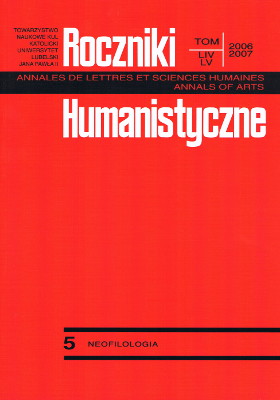Rewriting Personal Stories in Brick Lane by Monica Ali and Half a Life by V. S. Naipaul
Abstract
[Abstrakt tylko w j. polskim / Abstract only in Polish]
(Prze)pisywanie życia na nowo – Brick Lane M. Ali oraz Pół życia V. S. Naipaula
Celem artykułu jest ukazanie procesu kształtowania się tożsamości bohaterów Brick Lane i Pół życia w wyniku przemieszczenia kulturowego i interakcji z nowym otoczeniem. Prezentowany artykuł to także próba analizy sposobów kształtowania własnego losu, będącego wynikiem zmieniającego się postrzegania własnej osoby i ucieczki od tożsamości narzuconej. Elementem kluczowym w analizie literackiej powieści jest zastosowanie teorii postkolonialnych, ukazujących jednostkę jako złożoną, dynamiczną i interakcyjną strukturę. Sposób, w jaki bohaterowie tworzą swoje życie na nowym miejscu, odzwierciedla ich relacje z otoczeniem. Bohaterowie przepisują swoje losy dosłownie i w przenośni: albo dostosowując je do wymogów własnej kultury i tradycji, albo ukazując się innym takimi, jakimi chcą ich widzieć. Żyjąc na granicy dwóch światów – Zachodniego i Wschodniego bohaterowie muszą odnaleźć własne miejsce, które pozwoli im na zachowanie autonomii, przejęcie kontroli nad swoim losem i stworzenie własnej wyjątkowej tożsamości.
References
Ashcroft, Bill, Gareth Griffiths, and Helen Tiffin, eds. The Post-colonial Studies Reader. London and New York: Routledge, 1995.
Bhabha, Homi. The Location of Culture. London and New York: Routledge, 1994.
Bulbeck, Chilla. Re-orienting Western Feminism. Women’s Diversity in a Postcolonial World. Cambridge: Cambridge University Press, 2000.
Caws, Peter. “Identity: Cultural, Transcultural, and Multicultural.” In: D. T. Goldberg. Multiculturalism: A Critical Reader. Oxford, UK, and Cambridge, USA: Blackwell, 1997.
Chambers, Iain. Migrancy, Culture, Identity. London and New York: Routledge, 1994.
Goldberg, David Theo. Multiculturalism. A Critical Reader. Oxford, UK and Cambridge, USA: Blackwell, 1997.
Hajari, Nisid. “Finding Identity in Life’s Margins (A Book Review).” Newsweek (Atlantic Edition), 11/12/2001, Vol. 138, Issue 20.
Heidegger, Martin. “Building. Dwelling. Thinking.” In: M. Heidegger. Basic Writings. New York: Harper and Row, 1977.
Hooks, Bell. “Marginality as site of resistance.” In: Russell Ferguson et al. eds. Out There: Marginalisation and Contemporary Cultures. Cambridge, MA: MIT Press, 1990.
Jarniewicz, Jerzy. „Nieustająca wędrówka” (“A never-ending journey”). In: V. S. Naipaul. Pół życia (Half a Life). Warszawa: Noir Sur Blanc, 2004.
Mongia, Padmini. Contemporary Postcolonial Theory. A Reader. London: Arnold, 1996.
Said, Edward. Culture and Imperialism. London: Vintage, 1994.
Sarup, Madan. Identity, Culture and the Postmodern World. Ed. T. Raja. Edinburgh: Edinburgh University Press, 1996.
Seyhan, Azade. Writing Outside the Nation. Princeton and Oxford: Princeton University Press, 2001.
Spivak, Gayatri Chakravorty. “Can the Subaltern Speak?” In: B. Ashcroft, G. Griffiths, and H. Tiffin, eds. The Post-colonial Studies Reader. London and New York: Routledge, 1995.
Stout, Janice. Strategies of Reticence: Silence and Meaning in the Works of Jane Austen, Willa Carter, Katherine Ann Porter and Joan Didion. Charlottesville and London: University of Virginia Press, 1990.
Woodward, Kathryn. Identity and Difference. London: Thousand Oaks, New Delhi: SAGE Publications, 1997.
Yeatman, Anna. “Interlocking Oppressions.” In: Barbara Caine, and Rosemary Pringle. Transitions: New Australian Feminisms. Sydney: Allen and Unwin, 1995.
Copyright (c) 2007 Roczniki Humanistyczne

This work is licensed under a Creative Commons Attribution-NonCommercial-NoDerivatives 4.0 International License.





